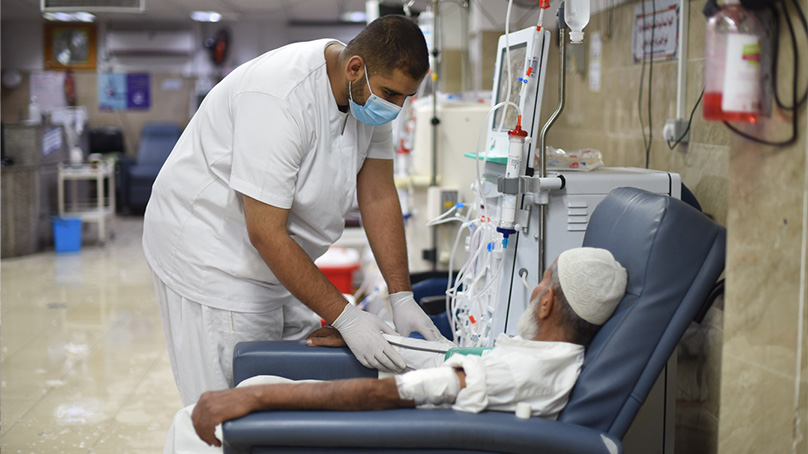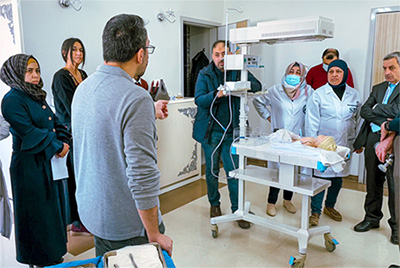
Hospitals are essential actors in achieving universal health coverage and contribute to implementing the vision for primary health care in the twenty-first century. A renewed focus on the roles, functions and operations of hospitals through an integrated and people-centred lens is critical. It brings a fresh perspective on the features of high-performing hospitals that are needed to meet present and future challenges to health and health systems. The hospital care and management programme is responsible for providing technical support to improve the hospital sector in the Region and resolution EM/RC66/R.4 on transforming the hospital sector was adopted by all Member States in 2019 during the 66th session of the Regional Committee for the Eastern Mediterranean.
Hospital strategic planning allows countries to build capacity in developing and implementing a national hospital sector strategy, as part of the national health strategy, in the context of the regional framework for action. Sudan was the first country to develop a national strategy. Pakistan and Palestine are currently developing their national/provincial hospital sector strategies. A guide “Path to transformation” has been developed to support countries develop and implement their hospital sector strategy. In addition, 10 countries have developed their hospital sector profile as the first step towards developing the national hospital sector strategy.
Related link
Strengthening the managerial capacities of hospital managers is critical as human resources are the most important resource of hospitals. Hospital managers need to possess adequate managerial knowledge and skills to conduct their managerial roles in more effective and efficient ways and should undertake continuous training. The WHO Regional Office has developed a capacity-building course for hospital managers that has been designed to respond to the needs of hospital managers to improve their core managerial competencies.
The courses cover all important components of hospital care, planning and management, including:
hospital governance
strategic thinking and planning
essentials of leadership
human resources management
financial management
quality improvement and patient safety
facility management
supply chain management
information management and
emergency and disaster management.
Face-to-face and virtual training of trainers and regular training courses have been developed and organized for more than 10 countries at regional and country level.
 Hospital sector performance measurement supports countries to develop a set of performance indicators, using regional performance indicators, for assessment of the hospital sector at national/subnational levels.
Hospital sector performance measurement supports countries to develop a set of performance indicators, using regional performance indicators, for assessment of the hospital sector at national/subnational levels.
Strengthening hospital resilience supports countries to strengthen their hospital resilience during emergencies and empowers them to build back better following emergencies. The hospital care and management programme has generated regional evidence regarding hospitals’ preparedness and response to COVID-19 and the lessons learnt provided a good platform for strengthening hospital resilience in the Region.
Strengthening emergency care system and provision supports countries to strengthen national emergency and trauma care systems and provisions covering emergency care services at the scene care, pre-hospital services, facility-based services and rehabilitation. The detailed supports are:
Emergency Care System Assessment (ECSA) with the generation of action priorities and development of an implementation roadmap to strengthen emergency care system. The ECSA tool has been used to gather information about the national emergency care system from a wide range of experts. The information can then be used to assess the existing system, identify gaps and develop consensus around action priorities. The action priorities then become the substrate for an implementation plan that may inform policy-makers, health system administrators, healthcare providers and other stakeholders. (conducted in eight countries in the region including Egypt, Iran, Jordan, Libya, Pakistan, Qatar, Sudan and Tunisia)
Capacity Building programmes
Emergency Unit Management and improvement (EUMi): To build the capacity of hospital managers and improve Emergency Unit Management (conducted in six countries- Egypt, Iran, Jordan, Libya, Sudan and UAE). A mentorship programme was established to support the application of course materials for the improvement of Emergency Units of hospitals.
Hospital Emergency Preparedness and Response (HEPR): This course is a component of the capacity building program for hospital staff in the region to be able to respond to emergencies from all-hazards. The main aim of this course is to support hospital managers and health professionals to build resilient hospitals. (conducted in four countries- Bahrain, Iran, Libya and Sudan)
Hospital Emergency Preparedness and Response for Infectious Disease Outbreaks (HEPRIDO): There is an increasing need for hospitals to be prepared for biological hazards and integrate their preparedness in the overall multi-hazard approach to hospital emergency preparedness. Therefore, considering a refocus on the current Hospital Emergency Preparedness and Response (HEPR) training program, a new course called “Hospital Emergency Preparedness and Response for Infectious Disease Outbreaks (HEPRIDO)” was developed. It addresses specific capacity gaps in managing infectious disease outbreaks in hospitals with emphasis on emerging and re-emerging infectious disease that have epidemic and pandemic potential. The training program will provide a platform to bridge the gap in enhancing a common and harmonized emergency response management system in hospitals that will address in the true sense of an “All Hazards Approach,” including outbreak hazards from infectious diseases. The training also promotes integrating hospital infection prevention and control (IPC) teams and programs in the hospital overall plans to manage emergencies.
 Assessment tools to evaluate the level of readiness of pre-hospital emergency medical services and hospitals for COVID-19
Assessment tools to evaluate the level of readiness of pre-hospital emergency medical services and hospitals for COVID-19
Pre-hospital emergency medical services and hospitals play a critical role within the health system in providing essential medical care to the community, particularly in crisis such as the COVID-19 pandemic. In order to assess the readiness of pre-hospital emergency medical services and hospitals to respond to the COVID-19 outbreak, two assessment tools have been developed. These tools (checklists) provide lists of key actions to take in the context of a continuous pre-hospital and hospital emergency preparedness process.
Ensuring readiness for COVID-19: checklists for emergency medical services and hospitals








